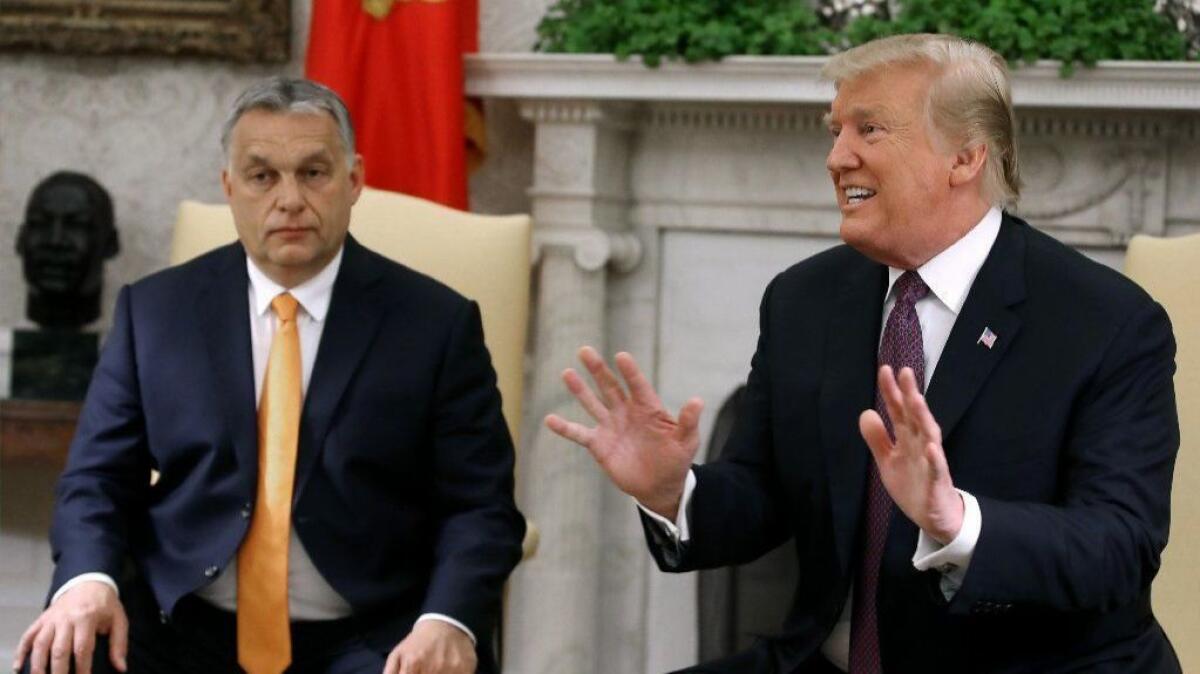Column: This is what foreign policy looks like when you have no strategy

- Share via
Reporting from Washington — Donald Trump once thought foreign policy would be easy.
“We would win if we would just sit down and negotiate — but using our best people,” he wrote as a private citizen in 2008. “We have all the cards.”
So as president he named himself negotiator-in-chief and tried to cajole North Korea’s Kim Jong Un to abandon nuclear weapons. He reimposed tough economic sanctions on Iran, betting he could force the ayatollahs to change their ways. He vowed to force China, Canada, Mexico and the European Union to give up what he called unfair trade practices.
He backed an uprising in Venezuela aimed at toppling its leftist president, Nicolas Maduro. He declared victory against Islamic State and ordered U.S. troops home from Syria. In his spare time, he asked his son-in-law, Jared Kushner, to arrange peace between Israel and the Palestinians.
He has achieved none of those outcomes.
We’re in an escalating trade war with China, and with both Trump and Chinese President Xi Jinping slapping tariffs on imports, consumers and businesses in both countries are likely to get hurt. The nuclear negotiations with North Korea are stalled, and Kim not only is still producing nuclear weapons material but also has started firing short-range ballistic missiles to show his pique.
The sanctions on Iran haven’t made its government more pliable; Tehran has threatened to resume aspects of its still-halted nuclear program. U.S. troops are still in Syria. And Kushner has yet to unveil his Mideast peace plan.
There’s a long list of familiar critiques of Trump’s foreign policy. It’s disruptive. It’s impulsive. It’s unpredictable. It’s contradictory. It cozies up to dictators like Russia’s Vladimir Putin and treats allies like Germany’s Angela Merkel with contempt.
All true. But let’s apply a more practical test: Is the president accomplishing the goals he set out for himself?
In most cases, the answer is no.
Sure, Trump has kept some of the foreign policy promises he made in his campaign. He moved the U.S. Embassy in Israel to Jerusalem, abandoned the 2015 nuclear agreement with Iran and announced U.S. withdrawal from the 2016 Paris agreement on climate change. But those were easy, accomplished by signing proclamations.
More substantively, Trump pursued the war against Islamic State to military success. But he still hasn’t found a way to extricate U.S. forces. Now the White House has sent an aircraft carrier and bombers to the region as a show of force to Iran, and is said to be reviewing Pentagon contingency plans to send thousands of troops.
He has pushed U.S. allies in NATO to increase their defense spending, but not enough for his satisfaction. He succeeded in renegotiating NAFTA, the trade deal with Mexico and Canada. But its ratification in the Senate is far from assured.
If his tough line on trade with China wrings serious reforms from Beijing, he’ll deserve bipartisan applause. But he’s not there yet. Talks broke down Friday, and while both sides say negotiations will continue, none are scheduled.
On the biggest priorities— more equitable trade with China, a nuclear disarmament deal with North Korea, an Iran less capable of threatening its neighbors — he gets, at best, an incomplete.
Last month, Robert Blackwill, a hawkish former aide to President George W. Bush, wrote a report card on Trump’s foreign policy for the Council on Foreign Relations. He gave the president the benefit of the doubt: “Trump’s foreign policies are better than they seem,” he wrote.
Blackwill’s overall grade: D-plus. “I’m a tough grader,” he explained.
Why is the Great Negotiator falling short?
“The problem with Trump is that he’s a weak president,” Michael Mandelbaum, a foreign policy scholar at Johns Hopkins University and author of “The Rise and Fall of Peace on Earth,” told me. “He doesn’t know how to make the government work. He isn’t interested in the details of policy. He doesn’t have a cohesive team of aides to help him.”
A second, related answer: Trump has strong opinions, but no coherent strategy.
“The president provides the hunches and instincts,” the State Department’s chief of policy planning, Kiron Skinner, said a bit undiplomatically at a conference last month. It’s the job of his staff to turn hunches into strategy, she said.
In Trump vs. California, the state is winning nearly all its environmental cases »
Skinner and other Trump acolytes have labored for months to turn the president’s slogan of “America first” into a more elaborate “Trump Doctrine.”
Its basic tenets, which Trump has outlined in several speeches, boil down to this: Every nation should pursue its own interests. For strong nations like the United States, alliances and multinational organizations just get in the way.
That’s the third reason Trump’s foreign policy isn’t working. It spurns the strong multilateral alliances that were a foundation of the U.S. strategy that grew out of World War II and won the Cold War.
“The world has changed, but allies are as important as ever,” Mandelbaum told me. “If you really want to get China to change its economic practices, you need to build a strong coalition to put pressure on them. It’s not clear that the United States can do it alone.”
Trump’s foreign policy still has a chance to improve. But his penchant for ignoring allies has badly weakened his diplomacy. If he hopes to succeed on the big things, he needs to abandon that part of the Trump Doctrine.
More to Read
Get the L.A. Times Politics newsletter
Deeply reported insights into legislation, politics and policy from Sacramento, Washington and beyond. In your inbox twice per week.
You may occasionally receive promotional content from the Los Angeles Times.











